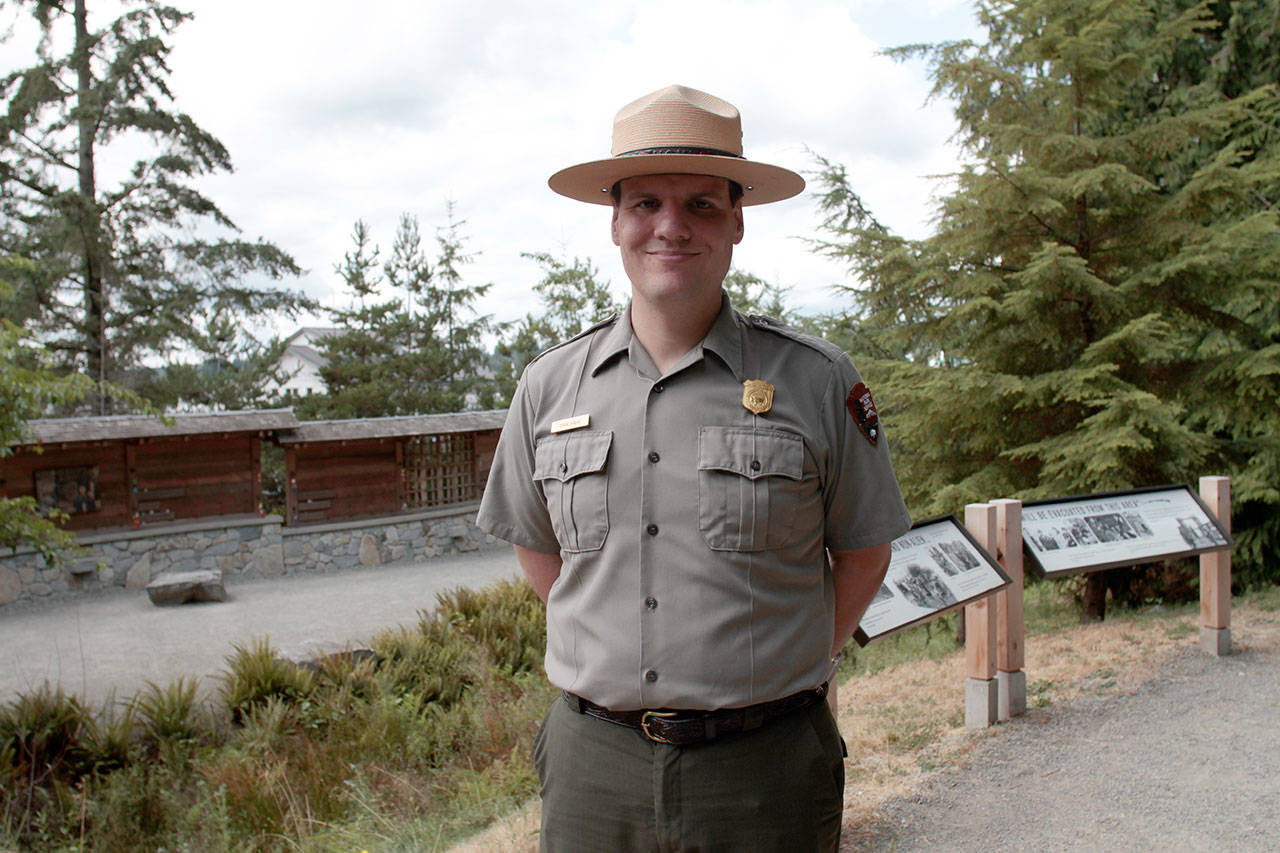Kevin Mahé makes the trek from Tacoma to Bainbridge three times a week to man his post at the Bainbridge Island Japanese American Exclusion Memorial, but it’s nothing when compared to the winding route that brought him from Louisiana to his eventual dream job of park ranger.
The iconic island site is a comparatively recent addition to National Park system, a satellite unit of Minidoka National Historic Site. The memorial received its first seasonal park ranger in 2015 with Andrew Wiseman. He returned to the post in 2016, but due to health issues could not return for a third summer. Without anyone else available to quickly take Wiseman’s place, Ron Coglon, one of the Bainbridge Island Japanese American Exclusion Memorial Association’s (BIJAEMA) board members, decided to step up and take the reins last year.
This summer, the park is manned, and guests greeted, by Mahé. He’s there Friday through Sunday, and will be at the memorial through Labor Day.
Education is his business — and business is good.
“Since 2016 we have seen a 250 percent increase in daily summer visitors,” Mahé said. “So we are definitely reaching more and more people every year, with the [road] signs
playing a role in the increase.”
Upon becoming part of the National Park system, official signage was placed along island roads directing visitors — and a few locals — to the park.
“Even locals that knew we existed that didn’t really have a great handle on where the memorial is are coming in,” Mahé said. “We’re getting a lot of people who even had no exposure to the history of Japanese American incarceration before, they didn’t know this happened.”
Mahé, who hails from Louisiana, just outside of New Orleans, and went to school in Kentucky, has worked at a number of national parks in the state since relocating here several years ago. His past posts include North Cascades National Park, Olympic National Park and Klondike Gold Rush National Historical Park in Seattle.
He said that, despite his travels, he was only vaguely familiar with the story of the forced removal and imprisonment of so many Japanese Americans in the wake of the attacks on Pearl Harbor through his work those other nearby sites.
“I think I had it [taught] in one history class,” he said. “Supposedly nowadays … you’re much more likely to have it than you were, so I think in every [new] generation it becomes something that’s addressed more.”
Mahé said his favorite part of being a park ranger is introducing people to the site and the story and its implications.
“Establishing deeper connections,” he said. “Like coming to a place like this and not just recognizing that this was a terrible thing that happened, but also [that] this has some possible repercussion to what is happening today, or some possible lessons to be learned.
“At the heart of it, it’s about constitutional rights and who they extend to and also how do we treat one another,” he added. “How we treat one another is always going to be relevant to the human experience.”
There exists within the site itself, Mahé said, the idea of harmony and making the best of an unfortunate past.
“This is a unique site in that it is primarily a historical site, a monument, but we also have this beautiful natural landscape,” he explained. “We’re nestled inside of a community park and we can talk about the natural harmony, because it’s a site about human harmony so let’s also talk about the harmony of nature. This used to be a site where you had all these harmful chemicals … and the cleanup afterward, so kind of a healing there just like the healing of the community.”
Perhaps even more personally fulfilling, he said, is the opportunity to have meaningful input regarding such a new position.
“We’re still establishing what it means for the parks service to be on site, so a lot of it’s establishing guidelines for future rangers,” Mahé said. “Also, developing a kid’s program for families that come in, because every National Park Service site has a junior ranger program.”
The Bainbridge Island Japanese American Exclusion Memorial is located at 4195 Eagle Harbor Drive NE. It is open every day. For more information, or to arrange a free guided tour, visit www.bijaema.org/visit.


